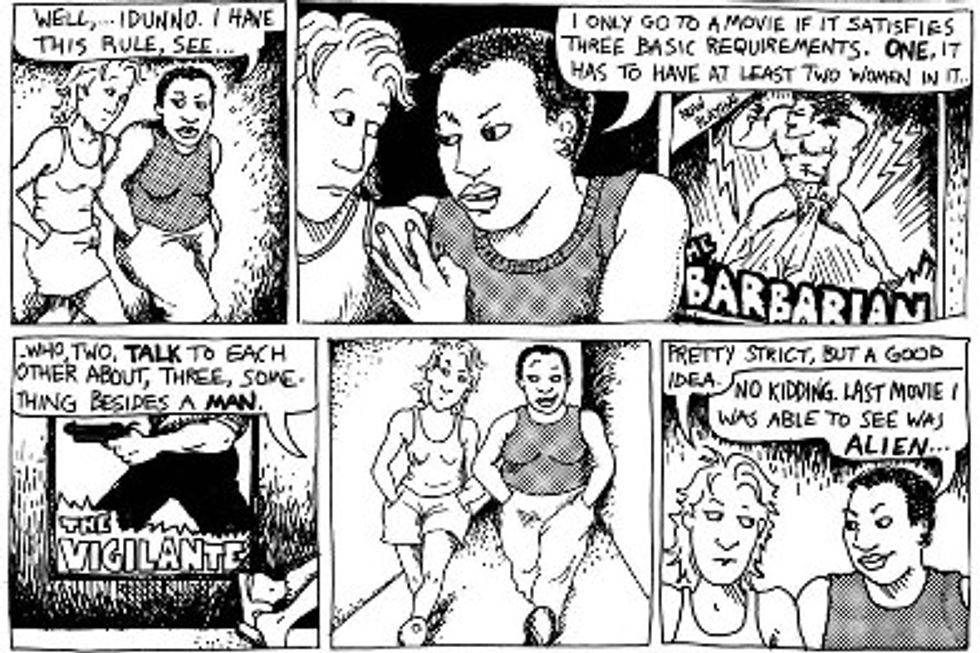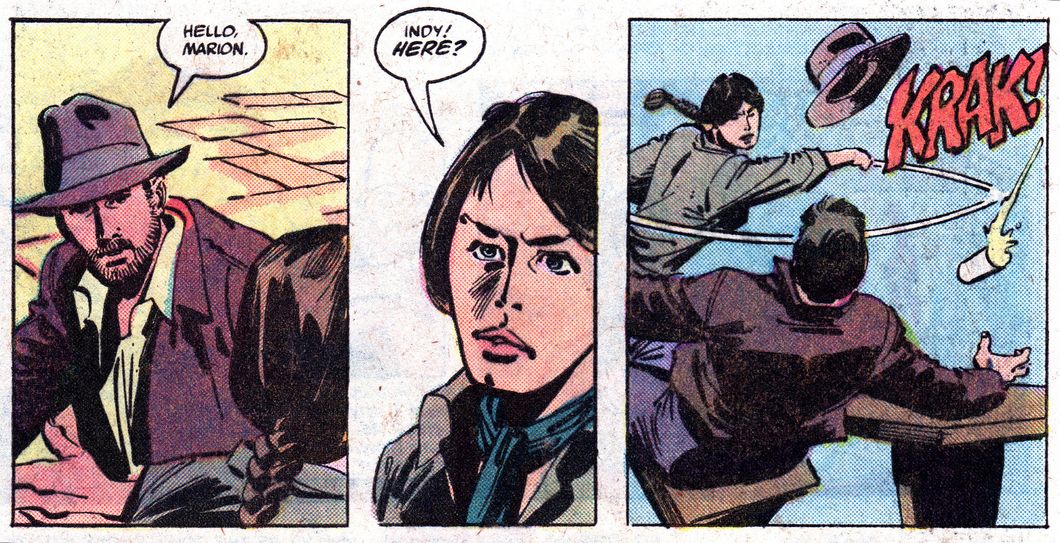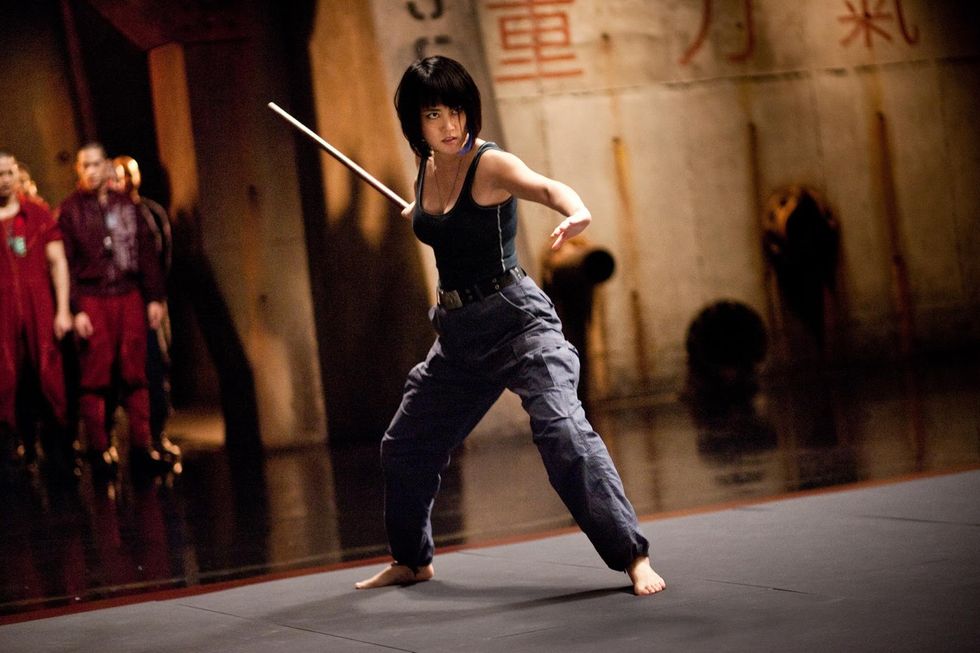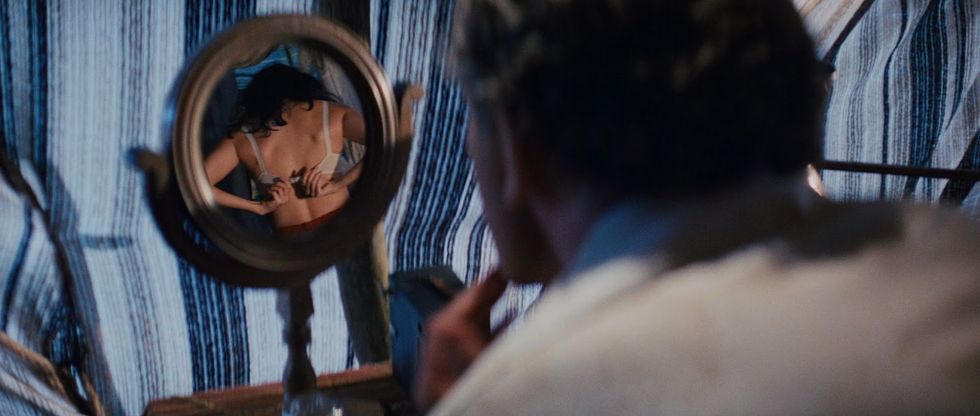Recently, I went with a few friends to attend a screening of "Raiders of the Lost Ark" at a nearby historic movie theater. While I was able to re-experience the excitement of the film for the first time in seven years, by the movie's end, my mind immediately evaluated the film. I wondered if "Raiders of the Lost Ark" had passed the the Bechdel-Wallace Test.
One of the most popular methods for assessing a film of how female characters are represented, the Bechdel-Wallace Test presents this set of criteria:
- The film must have at least two female characters with names.
- These two female characters must talk to each other.
- These two female characters must talk about something other than a man.

Image Source: Wikimedia Commons
Sounds simple, right? Here's how "Raiders of the Lost Ark" stacks up against the rules:
- There are two female characters: Marion and Sallah's wife, Fayah. Both characters are named.
- Marion and Fayah only speak to one another for a very brief amount of time.
- Their conversation involves whether a stray monkey should be permitted to stay at the home of Fayah and Sallah.
As demonstrated by this assessment of "Raiders of the Lost Ark," the film passes the Bechdel test, yet the representation of female characters described above appears to be weak. The question is: how fair is this assessment in achieving its goals?
The Bechdel Test—which went viral from a 1985 comic strip by feminist cartoonist Alison Bechdel—has faced a range of mixed reviews. Those who applaud the test as an effective method to evaluate films for feminism commend it for FINALLY calling attention to sexism in Hollywood. IMDB introduced an F-rating system to evaluate films based on the Bechdel Test and the presence of female film personnel (see here and here). Similarly, in Sweden, a number of cinemas employed the Bechdel Test to serve as a rating system for gender bias in films. Yet, despite its popularity, critics of the Bechdel-Wallace Test point out the holes in its criteria.
The most notable critic of the Bechdel-Wallace Test was a Tumblr user, chaila, who expressed her frustrations when a recent film—with a strong, heroic female protagonist at the helm—was tagged as a movie that was unable to meet the criteria. (Her account has since been deactivated.) This film was 2013's "Pacific Rim", and in her post, she argued that this method of feminist film evaluation should be reformed into a different formula.
Her reason? She expressed her frustration that a film such as "Pacific Rim", in which the female protagonist, Mako Mori (above), leads the narrative fails the Bechdel Test simply because she is the only female character in the film. Chaila also expressed disappointment that a film such as "Pacific Rim" can so easily be dismissed as “anti-feminist", while a film like "Thor" can pass the test in the beginning of the movie due to a brief scene in which two female characters, Jane and Darcy, discuss astrophysics.
After venting her frustrations online, chaila was hailed for pioneering a new set of criteria as an alternative to the ideas of the Bechdel Test: the Mako Mori test. The test is comprised of these set of rules:
- The film must have at least one female character with a name.
- At least one female character has her own narrative arc.
- The female character's narrative arc does not support a man's story in the film.
Films that are not action and adventure-based, such as "Breakfast at Tiffany's" (1961) or "Casablanca" (1942), that were once unable to fulfill Bechdel's rules also found a victory with the Mako Mori test. (Sadly, when reevaluated, 1981's "Raiders of the Lost Ark" only satisfies the first of the three criteria.)
However, proponents of evaluating films for strong female representation should understand one thing—these tests should not be used as THE measure of how “feminist" a film is (or is not). SURE, these tests are a great way of measuring whether female characters are represented well in elements of a film such as story, dialogue, etc, and when evaluating films with both tests, there's less room for films to fall through the cracks. Yet, these tests do not present sufficient criteria to label films that fail as being “sexist". Instead these tests should be taken with a grain of salt; Alison Bechdel has even said this herself. The criteria of both tests, while generated for a noble cause, can be extremely subjective.
Feminist film theorist Laura Mulvey's “male gaze theory" is an example. Mulvey's theory suggests that since Hollywood is--and has been throughout its history--a business largely dominated by men in the roles of directors, producers, screenwriters, etc. Female characters are often portrayed through “their eyes", and as a result, are often depicted as objects of male desire.
This theory is largely referenced in describing sexist cinematography of female characters, (such as the above scene featuring Marion in "Raiders of the Lost Ark") but Mulvey goes onto explain that because many films, even those with female characters in the lead roles, women are forced to view films through a “male perspective."
However, neither the Bechdel or the Mako Mori test include criteria with the goal of evaluating the presence of the male gaze or male perspective in films. Similarly, it important to consider how the presence of male figures in the making of a film shaped how females were ultimately portrayed.
My advice? Use these tests as guidelines or “suggestions," not rules, to create your own criteria of what is important to you as a feminist AND a film consumer.
In my case, when reflecting on "Raiders of the Lost Ark", I found myself disappointed with Marion as a female lead. In introducing us to Marion, "Raiders of the Lost Ark" lead us to believe she was tough and could hold her own, but then she quickly became a “damsel in distress" trope. I would have preferred to see a character similar to Diana in this summer's (hopefully) game-changing "Wonder Woman": a female character who not only demonstrates strength on her own, but also played out to be a multidimensional character. As Diana fought Aries, her battles served a specific purpose: to fight for her principles.
To develop an idea of how to assess the media you consume for quality female representation, try developing a set of questions that reflect your views; one example could be “Do I want to see more female directors, producers, and screenwriters to better represent females in films?"
In addition to using these tests, make an effort to inform yourself on various studies in feminist film theories, criticism, and history; a great start would be reviewing the books and other works written by feminist film theorists and historians such as Laura Mulvey, Molly Haskell, and Jeanine Basinger (just to name a few). And then ask yourself: what does a “feminist film" mean to me?
Would you say that your favorite films reflect standards of feminism? Why or why not? Tweet me your thoughts @missjulia1207!
- The New Bechdel Tests To Measure Diversity In Movies ›
- Bechdel test - Wikipedia ›
- What Really Makes a Film Feminist? - The Atlantic ›
- Does It Matter If the Bechdel Test “Fails” Feminist Films? | IndieWire ›
- Why the Bechdel test doesn't (always) work | Life and style | The ... ›
- Bechdel Test -- Feminist Litmus Test for Movies -- Useless Political ... ›
- Creating The Next Bechdel Test | FiveThirtyEight ›
- Stop using the Bechdel Test to Measure Feminism – Bri Castellini ... ›
- Why the Bechdel Test Fails Feminism | HuffPost ›


















